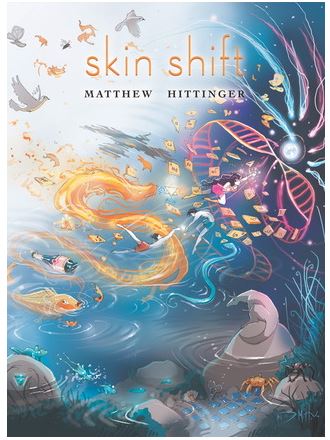Matthew Hittinger. Skin Shift. Sibling Rivalry Press, 2012. Paperback. 113p. $19.95. 978-1-937420-14-7.
 How many different ways can we change our skin, and how does that change matter? That is the principal question taken up by Matthew Hittinger’s 2012 collection Skin Shift. Hittinger approaches this topic from a variety of vantage points, examining changes as different as Narcissus to Wonder Woman, from folktales to He-Man. In every piece, however, the idea of change is always present. Sometimes the change is desired; other times, it is unstoppable. In all these changes, though, it’s not just the skin that shifts, but something inside as well.
How many different ways can we change our skin, and how does that change matter? That is the principal question taken up by Matthew Hittinger’s 2012 collection Skin Shift. Hittinger approaches this topic from a variety of vantage points, examining changes as different as Narcissus to Wonder Woman, from folktales to He-Man. In every piece, however, the idea of change is always present. Sometimes the change is desired; other times, it is unstoppable. In all these changes, though, it’s not just the skin that shifts, but something inside as well.
This collection contains the work of two of Matthew Hittinger’s chapbooks: Narcissus Resists and Platos de Sal, both of which are among the strongest works in the collection. Although not related to anything else, thematically, this work serves as an update to Ovid’s Metamorphoses in subject matter, even name-checking the classic at one point.
If you prefer poetry with a conversational tone and a fast-flowing tempo, you will find the best pieces in this collection are “Narcissus Resists” and “Platos de Sal” which attack the idea of transformation on two different fronts. “Narcissus Resists” updates the ancient Greek myth of Narcissus and turns it on its head by placing it in a modern setting with a focus on technology, the Internet, mass media, and how these create change in the modern world. “Platos de Sal,” on the other hand, tells the story of a young gay man conversing with his abuela about the changes to the homefront that have happened since he left and the transitions in the older woman’s life that have echoes in his own. Both are incredibly touching, written in such a way that the reader wants to simultaneously read through them at a rapid clip so as to finish the whole piece and to slow down and savor the unfolding narrative.
In many cases, the intrepid reader will need to read with one eye on the poem and another on a reference source to get the full nuance of each poem. The allusions and references are thick on the page, and, due to the author’s wide-ranging experience in both literature and art, not all of these allusions are immediately recognizable to all readers. While the poems are readable without this level of knowledge, much of the meaning is sacrificed without this context, especially in the shorter pieces.
This collection is suggested for any library with a modern poetry collection and for any person interested in the idea of change. Librarians may wish to suggest this to English teachers as extended reading because this work plays on many classic works with transformation as a central theme including Ovid’s Metamorphoses, Kafka’s The Metamorphosis, and a number of Greek and Roman myths.
Reviewer: Mack Freeman
